DBA: Alternative To WEAT

Summary
- I previously recommended the Teucrium Wheat Fund due to my bullish view of grain markets and El Niño conditions.
- Since the recommendation, the WEAT ETF has rallied over 13%.
- For those who missed the initial surge, they may want to consider the DBA fund that invests in a portfolio of agriculture commodities.
Olga Kostrova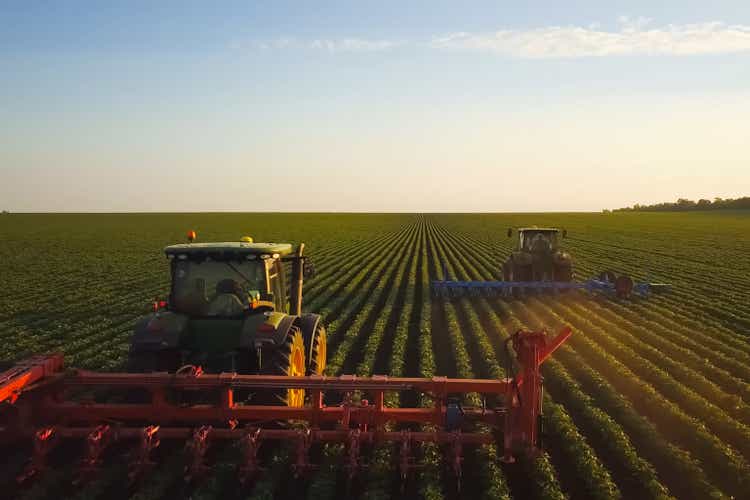
Early last week, I penned a bullish article on the Teucrium Wheat Fund (WEAT), upgrading it to a buy on my bullish view of grain markets due to developing El Niño conditions. Since my article, the WEAT ETF has been on a tear, rallying over 13% (Figure 1).
Figure 1 - WEAT ETF has rallied significantly since my recommendation (Seeking Alpha)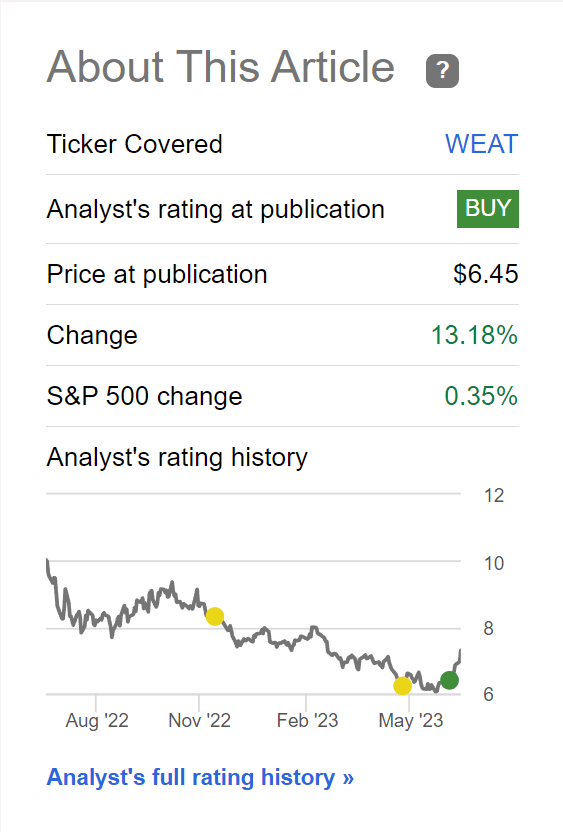
While I enjoy the strong price action in the WEAT ETF, the question for those who missed the initial rally is, will the rally continue and are there other ways to play it?
El Niño Should Last For A While
First, for those wondering whether they have missed the trade, I believe the short answer is no. The premise for my bullish view on agricultural commodities is predicated on developing El Niño conditions that were confirmed by the NOAA only on June 8th.
El Niño is part of the climate cycle that is measured in months and quarters. According to the NOAA, El Niño conditions typically last 9-12 months while La Niña conditions last 1-3 years.
Furthermore, both El Niño and La Niña tend to develop in March-June and reach peak intensity in December-April, so we are likely in the early innings of the current El Niño.
Speculators Not There Yet
Another factor that gives me comfort to stay long agricultural commodities is that in general, speculators have not bought into the thesis yet. According to data compiled by Saxo Bank's Ole Hansen, speculators were net short the six major crops as recently as June 13th, the date of the most recent Commitment of Traders ("COT") report (Figure 2).
Figure 2 - Traders were net short crops (Saxo Bank)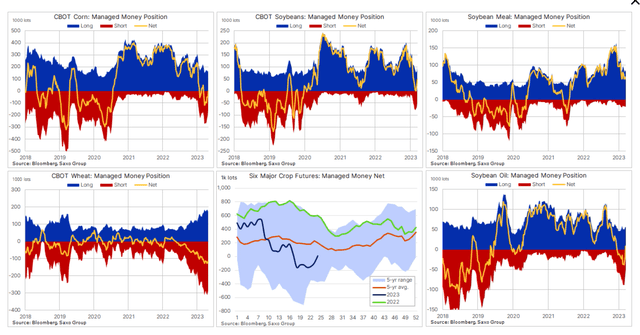
In fact, the strong move we recently saw in grain prices could be a sign that these speculators were caught wrong-footed by the El Niño developments and had to cover their shorts.
Alternative To WEAT
Understandably, investors may be hesitant to chase the WEAT ETF, as it has rallied close to 20% since I discussed bullish agriculture conditions in early May.
If that is the case, wary investors may want to consider the Invesco DB Agriculture Fund (NYSEARCA:DBA), an exchange-traded fund that uses a portfolio approach to investing in agricultural commodities.
The DBA fund tracks the DBIQ Diversified Agriculture Index, a rules-based index composed of liquid futures contracts on agricultural commodities. The DBA fund is rebalanced annually in November. Figure 3 shows the default commodity weights of the underlying index at rebalancing.
Figure 3 - DBIQ Diversified Agriculture Index weights (DBA prospectus)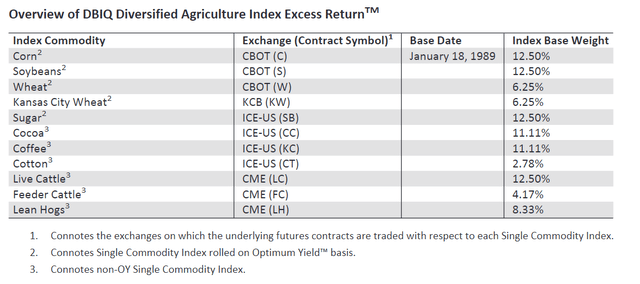
Investors should note that the DBA fund does not invest in the underlying commodities directly. Rather, the fund invests in futures of the various commodities. Hence as the futures in DBA's portfolio near maturity, the fund must 'roll' onto a futures contract further out in maturity.
Generally, if commodities are in contango, the expiring futures contract will trade at a lower value than futures with more time to maturity, so the DBA fund may lose value on each contract 'roll'. This 'roll decay' is a common issue with futures-based investment funds and why I do not recommend futures-based funds as long-term portfolio holdings.
The DBA fund has $880 million in assets and a 0.91% expense ratio.
Portfolio Holdings
Figure 4 shows the current portfolio holdings of the DBA fund.
Figure 4 - DBA fund holdings (invesco.com)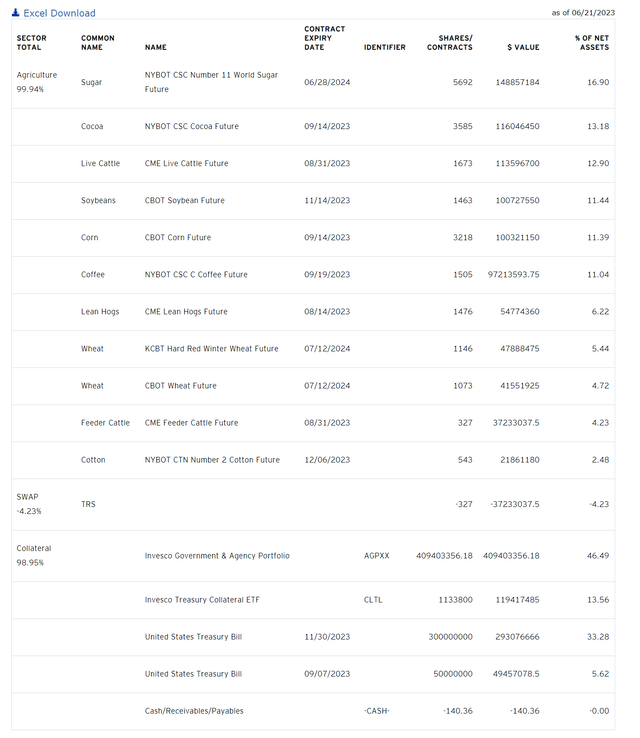
Due to the strong performance of sugar in the past few months (Figure 5), the DBA fund currently has a 16.9% portfolio weight compared to the default 12.5% weight. Other commodity weights are closer to their default index weights.
Figure 5 - Sugar has been on a tear (tradingeconomics.com)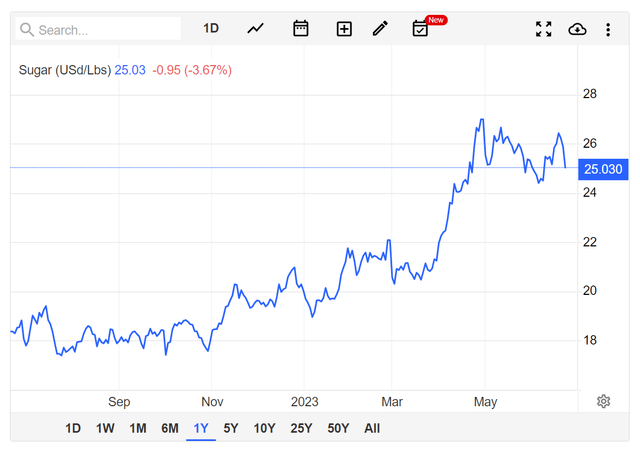
Returns
Figure 6 shows the historical returns of the DBA fund. Overall, the DBA fund has delivered modest long-term returns, with 3/5/10/15Yr average annual returns of 14.7%/2.0%/-1.9%/-3.4% respectively.
Figure 6 - DBA fund historical returns (morningstar.com)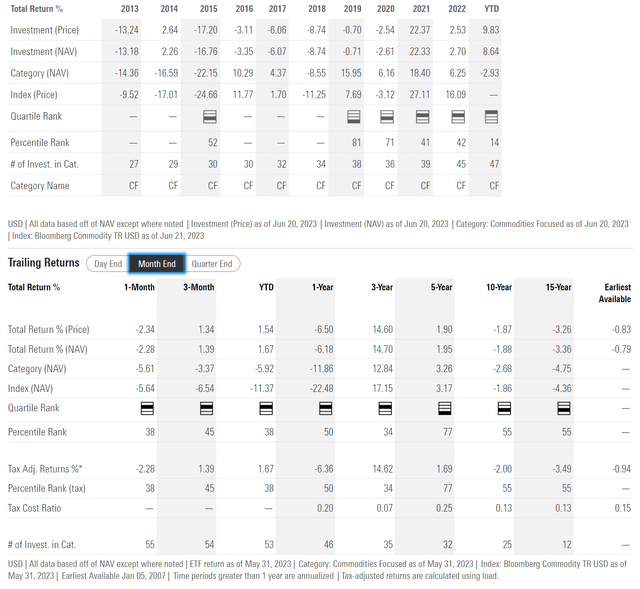
There are two points investors should note. First, the DBA fund's long-term returns are negative, as it suffers from futures roll decay as mentioned previously.
Second, the DBA fund has a strong 3-Yr average annual return as food security has been a topical issue since the COVID pandemic and the Russian/Ukraine war.
El Niño's Impact Is Global And Widespread
If the current El Niño develops into one for the record books as many experts expect, then we should see its impact extend beyond just wheat. For example, according to recent agricultural reports from the USDA, "57% of the domestic corn crop and 51% of soybeans are dealing with drought conditions, up 12% from last week for both". As the current El Niño develops, we should see crop conditions worsen.
Similarly in Europe, the EU's crop monitoring service MARS recently reduced its crop forecasts for grains and oilseeds due to adverse weather conditions.
Conclusion
Continuing on the El Niño-impact theme, investors may want to consider the Invesco DB Agriculture Fund as an alternative or supplement to the WEAT ETF. The DBA fund invests in a basket of agricultural commodity futures. The developing El Niño should negatively impact grains and livestock across the globe and the DBA fund is a convenient way to bet on a host of agricultural commodities instead of just focusing on wheat.
This article was written by
Analyst’s Disclosure: I/we have a beneficial long position in the shares of WEAT either through stock ownership, options, or other derivatives. I wrote this article myself, and it expresses my own opinions. I am not receiving compensation for it (other than from Seeking Alpha). I have no business relationship with any company whose stock is mentioned in this article.
Seeking Alpha's Disclosure: Past performance is no guarantee of future results. No recommendation or advice is being given as to whether any investment is suitable for a particular investor. Any views or opinions expressed above may not reflect those of Seeking Alpha as a whole. Seeking Alpha is not a licensed securities dealer, broker or US investment adviser or investment bank. Our analysts are third party authors that include both professional investors and individual investors who may not be licensed or certified by any institute or regulatory body.
